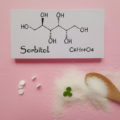Sorbitol intolerance

We’ve previously dealt with lactose, fructose, histamine and gluten intolerances in this blog.
Sorbitol intolerance
Now let’s take a look at another common food intolerance. Almost everyone has heard of lactose or fructose intolerance. But not everyone knows about sorbitol intolerance. This intolerance is much less well known, even though many people are unable to tolerate sorbitol, a sugar substitute, particularly in large quantities.
What is sorbitol intolerance? Sorbitol intolerance means that the sugar alcohol sorbitol can’t be broken down in the small intestine, or can only be broken down partially. Instead, it’s metabolised by bacteria in the colon. This leads to stomach aches, flatulence, nausea, tiredness, feeling full, and often diarrhoea and halitosis. Many people experiencing these symptoms initially think of lactose or fructose intolerance, because many of us are unfamiliar with sorbitol intolerance.
Sorbitol intolerance is also incurable
Fruit and vegetables can both make symptoms worse. Reduced-calorie foods are often poorly tolerated by sufferers. The bad news: just like with other food intolerances, sorbitol intolerance is incurable. Treatment consists of avoiding foods that contain sorbitol. If you suffer from sorbitol intolerance, you need to seriously limit or entirely avoid foods containing sorbitol. Sorbitol intolerance can only by treated by changing your diet.
Contact your doctor if you think you might be suffering from sorbitol intolerance. Your doctor will carry out a hydrogen breath test (H2 test) to diagnose it. Some sufferers will show symptoms with any sorbitol intake whatsoever, while others may be able to tolerate small amounts. The tolerance threshold varies from patient to patient. Any change to your diet should always be supervised by a doctor or dietician.
Which foods should you avoid if you’re sorbitol intolerant?
Fruit: Apricots, apples, pears, blackberries, cranberries, dates (both fresh and dried), peaches, currants, cherries, yellow plums, plums, grapes and raisins. Dried fruit and fresh stone fruit contain the largest amounts of sorbitol. Vegetables: Aubergine, broccoli, fennel, ready-made salads, paprika and red cabbage.
Drinks: Beer, wine and juice made from fruit containing sorbitol, schnapps, sparkling wine, energy drinks, fruit nectar, fresh fruit juice, fruit juice drinks, “light” drinks and soft drinks. Dairy products containing fruit, such as fruit yoghurt and quark. Sufferers also need to avoid a whole raft of sweet treats, including chocolate bars, gummy bears, waffles, sweets, Nutella, sweet fruit dishes, marmalade, ice cream and peanut butter.
Products aimed at diabetics, reduced-calorie diet products and reduced-calorie foods may also contain a large amount of sorbitol and should be avoided. Plus, sufferers also need to cut out bratwurst, bockwurst, salami, ham, liver sausage, smoked sausage, bacon, veal sausage, pork and meat paste.
And the list just keeps getting longer. Smoked fish, tuna in oil, sardines in oil, fried squid rings, fish fingers and smoked eel also need to disappear from your menu, as well as savoury snacks, ice cream, flips, crisps and nachos. We’ll admit that it’s hard to give up so much. But just remember: the dose makes the poison. If you suffer from a mild sorbitol intolerance, you may still be able to eat many of these foods, but in small doses.
You’re not condemned to an empty plate
Thankfully there are still plenty of fruits that you can enjoy even with a sorbitol intolerance. Sorbitol-free fruit and fruit with low sorbitol content: Raspberries, redcurrants, blueberries, cranberries, gooseberries, strawberries, oranges, mandarins, pineapple, bananas, figs, pomegranates, grapefruit, honeydew melon, kiwi, mango, papaya, passionfruit, quinces, watermelon and citrus fruits. Sorbitol-free vegetables include fresh lettuce, beans, pumpkin, tomatoes, courgette, spinach, parsnips, radishes, kale, kohlrabi, olives and asparagus.
Wheat, rice, noodles, milk, cream, natural yoghurt and unprocessed meat and fish products are safe, too. Herbal teas, e.g. with fennel, anise, caraway and camomile sooth the stomach and intestines. Eggs, oil, fresh herbs, salt, and pepper can also stay on the menu.
Stay away from ready meals
Sufferers need to be particularly careful with ready meals, because the food industry uses large amounts of sorbitol as a carrier, humectant and sweetener. To create sorbitol, the industry uses the glucose found in wheat and corn starch.
The consumption of ready meals is steadily increasing as busy workers increasingly reach for them, meaning that people often exceed theirtolerance threshold. This affects baked goods, meat and fish products, desserts, frozen pizzas, cider vinegar, ready-made salad dressing, and remoulade. Generally speaking, sufferers should try and avoid all industrially produced ready meals where possible.
Sorbitol is also used in lots of spice mixes. Because sorbitol doesn’t cause tooth decay, it’s often used in toothpaste and tooth care products. Those affected also need to be careful with food supplements, as sorbitol is used as a carrier for flavours and vitamins. Also important to remember: people with rare hereditary (inherited) fructose intolerance can’t have sorbitol either, because it’s converted to fructose by the metabolism.
Consumers should also pay close attention to E numbers. Sorbitol is generally labelled as E420 on the list of ingredients. Other labels to watch out for include E432, E435, E436, E433, E434, E493, E494, E491, E492, and E495. Any product labelled with these numbers will contain sorbitol. Foods containing more than 10 percent sorbitol must also be labelled “may have a laxative effect if consumed excessively”.
Stay healthy and watch what you eat.
This article is not designed for self-diagnosis, treatment or medication. It is not a substitute for seeing a doctor.




